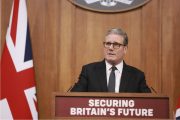
Towards the end of the Group of Seven (G7) Foreign Ministers’ meeting in the Japanese resort town of Karuizawa on April 18, top diplomats slammed China’s assertiveness and military belligerence regarding its claims to Taiwan. Nonetheless, the Russo-Ukraine conflict took center stage in the G7’s communiqué denouncing Putin’s actions in Ukraine.
The communiqué, put together by the foreign service officials of the United States, Canada, France, Germany, Italy, Japan, and the U.K., as well as the High Representative of the European Union (EU), displayed G7 leaders’ desire to “to uphold and reinforce the free and open international order based on the rule of law.” Moreover, the document would be the template for G7 leaders to abide by for May’s summit in Hiroshima.
Addressing the media, Japanese Foreign Minister Yoshimasa Hayashi said that the communiqué by G7 was a “strong objection to unilateral attempts to change the status-quo anywhere in the world,” alluding to Chinese and Russian actions that seek to establish a multipolar world order instead of one dominated by Western powers.
Furthermore, leaders also broached the topic of North Korea, amid Pyongyang’s explorations of WMD (weapons of mass destruction) and intercontinental ballistic missile tests. Regarding North Korea, the ministers also vehemently decried Pyongyang’s tests of ballistic missiles at “an unprecedented frequency and in unprecedented manners,” the Japanese Foreign Ministry declared.
In response to North Korean missile threats, Japan, South Korea, and the United States have enhanced bilateral and trilateral security cooperation, such as rare missile-defense exercises entailing all three countries in the Sea of Japan. These exercises came as the United States and South Korea began large-scale combined air drills the same day with about 110 aircraft participating, based on reports by the Yonhap news agency.
On April 14, North Korea had announced that it tested the Hwasong-18, a new solid-fuel intercontinental ballistic missile (ICBM), to “radically promote” its nuclear counterattack capability, according to state media. The ICBM has been believed to be able to target most if not all of the continental United States. Consequently, the Japanese government briefly issued a J-Alert warning for Hokkaido residents to take immediate shelter.
Hinting at the likelihood of future missile tests, North Korean dictator Kim Jong-un has urged for “more practical and offensive” capabilities and an enhanced “war deterrent,” the latter being an euphemistic allusion to his nuclear arsenal.
Increased engagement with the “Global South” nations was another major topic for the meeting on Monday, after the top diplomats began their talks on Sunday with a working dinner. The “Global South” nations are a loose grouping of some 100 countries, including India, Indonesia, Brazil, and South Africa.
During Sunday’s dinner, G7 representatives talked about “various challenges” in the Indo-Pacific region, such as China’s military moves near self-ruled Taiwan and North Korea’s recent provocative missile launches.
That being said, Russia remained a top concern for G7 leaders, who planned to mount further pressure on Russia by “intensifying sanctions against Russia, coordinating and fully enforcing them,” and would back Ukraine “for as long as it takes.”
Additionally, the 21-page document posited that any solution to the Ukraine conflict “must ensure Russia pays for the damage it has caused,” blaming “economic vulnerabilities” on Russia’s “weaponization of resources” rather than the U.S.-led sanctions on Russian produce. The document also stated that “Russia’s irresponsible nuclear rhetoric and its threat to deploy nuclear weapons in Belarus are unacceptable,” alluding to the recent deal between Russia and Belarus to have Russian nuclear weapons stationed on Belarusian soil.
While Russian military forces are reportedly making progress on the battlefield, America has allegedly expressed doubts about the success of Ukrainian efforts in the conflict, based on recent Pentagon leaks. China, a major trade partner for all G7 countries, remains adamant in keeping friendly ties with Russia, as authoritarian leader Xi Jinping refrained from denouncing Russian actions in Ukraine.
As this year’s host, Tokyo has clearly articulated that the Russo-Ukraine conflict only showcases the importance for collective defense in Asia.
Japanese Prime Minister Fumio Kishida, whose government has overhauled the country’s military spending in the face of increasing Chinese pugilism, has been cautioning the world that “Ukraine today could be East Asia tomorrow.”
“Japan’s basic position … on Ukraine is that the security of Europe and that of the Indo-Pacific cannot be discussed separately,” a Japanese government official said before the talks.
“They are intertwined with each other.”
Further undermining European unity were French president Emmanuel Macron’s recent comments on the EU’s ties with the United States and calls for European strategic autonomy. Macron’s comments after his recent April visit to Beijing stirred outcry from some in the United States and Europe, as they called into question France’s commitment to aligning with EU interests.
Paris has worked to mitigate the international fallout, maintaining that France’s views have remained the same, with most analysts stating that they expected the G7 to reinforce previous positions warning China against “changing the status quo by force.”
That being said, Macron’s statements exposed a reality for the G7 countries, opined Paul Nadeau, adjunct professor of political science at Temple University’s Japan campus.
“Each member of the G7 still wants a bit of autonomy in the way they pursue their relationship with China,” Nadeau told AFP. “They don’t want to overcommit, they want to maintain some freedom of maneuver.”
Also, Berlin reacted strongly to Macron’s comments. After the French leader’s visit to Beijing, German Foreign Minister Annalena Baerbock visited China to speak “in the name of Europe,” or so she claimed. Baerbock alleged that she articulated “the common European conviction that a unilateral change of the status quo in the Taiwan Strait, and in particular a military escalation, would be unacceptable.”
“A military escalation in the Taiwan Strait … would be a horror scenario for the entire world,” Baerbock said on April 14 during her visit to Beijing.
On China-Taiwan relations, the G7 document asked China to “abstain from threats, coercion, intimidation or the use of force. We remain seriously concerned about the situation in the East and South China Seas.… There is no legal basis for China’s expansive maritime claims in the South China Sea, and we oppose China’s militarization activities in the region.”
Notably, the gathering of G7 leaders took place after China’s military completed three days of massive military exercises around Taiwan, following Taiwanese President Tsai Ing-wen’s meeting with U.S. House Speaker Kevin McCarthy in California. The drills included air and sea blockade training with an aircraft carrier, and simulated warplane strikes with live ammunition under “actual combat conditions.”
China views Taiwan as a renegade province and has expressed the need to reunite the island with the mainland, by force, if necessary. Beijing has frequently decried foreign forces intervening in what it claims are its “internal affairs.”
However, although the G7 ministers urged China “to act as a responsible member of the international community,” Foreign Minister Yoshimasa Hayashi, host of the summit, tried to diplomatically emphasize “working together with Beijing” on global challenges as well as areas of common interest and “building a constructive and stable relationship.”
In response, Chinese Foreign Minister Wang Wenbin hit back at the G7, claiming the bloc had “grossly interfered in China’s internal affairs and maliciously smeared and discredited China.” Wang alleged that the joint G7 statement manifested the group’s “arrogance, prejudice and deliberate desire to block and contain China. We deplore and reject this and have made a strong démarche to the host [of this year’s G7] Japan.”
Wang further stated that Taiwan was “part of China’s sacred territory” and the one-China principle was “what underpins peace and stability across the Taiwan Strait.” Hence, Wang continued, to ensure “real peace” in the Taiwan Strait, it was “absolutely essential” to “unequivocally oppose and stop any act for ‘Taiwan independence.’”
Prior to the onset of the G7 meeting on April 15, Ukrainian Finance Minister Serhiy Marchenko had said that a new international economic support package of US$115 billion would boost Ukraine’s confidence in tackling Russia, amid increasing acknowledgements that the conflict could drag on.
Marchenko said that G7 finance ministers had assured him during the recent International Monetary Fund (IMF) and World Bank meetings in Washington that they would back Ukraine for as long as needed. Such attitudes can be contrasted from those of last year, when Western nations had urged Ukraine to agree to end the conflict with Russia.
The Ukrainian minister said that the new wave of economic support — via a new four-year, US$15.6 billion IMF loan — was “tremendously” vital for Ukraine.
“It helps us tremendously because it provides certainty that the IMF, together with G7 nations and supporters of Ukraine, will step in with money to cover our needs for four years,” he said. “Compared with the last spring meetings, I’m feeling more confident that we can prevail in this war.”
“Financial support is very necessary, as well as military support,” Marchenko said.
“We should be ready that this war will last longer than we expected,” he added.
Marchenko expressed Ukraine’s gratitude for American economic and military support — about US$50 billion since the start of the conflict in February 2022. Besides, he stated his confidence that the U.S. Congress would maintain bipartisan support for Ukraine, notwithstanding calls by some Republicans to reduce funding.
Additionally, Marchenko also said it was crucial to start reconstructing Ukraine’s energy infrastructure, roads, schools, and housing.
The Ukrainian politician also added that Ukraine could develop war insurance, a project already underway with the World Bank’s Multilateral Investment Guarantee Agency (MIGA), to assuage the concerns of global companies participating in the country’s reconstruction efforts that have been expected to cost at least US$411 billion.
Alluding to over US$20 billion of debt that Ukraine owes foreign bondholders, the minister admitted that he is not yet in talks on whether to prolong a two-year debt moratorium agreed to last August.
“It is necessary to protect the reliability of the markets for future reconstruction,” he said. “We will have time to find a solution.”
Marchenko added that G7 officials had told him they were broadly supportive of finding a way to utilize seized Russian assets to compensate Ukraine for the conflict. Nevertheless, they had to find a legal solution to “a very complicated question.”
In an interview with leftist media outlet CNN, U.S. Treasury Secretary Janet Yellen had warned that there were legal restrictions on using frozen Russian assets to pay Ukraine for damage incurred during the conflict.




